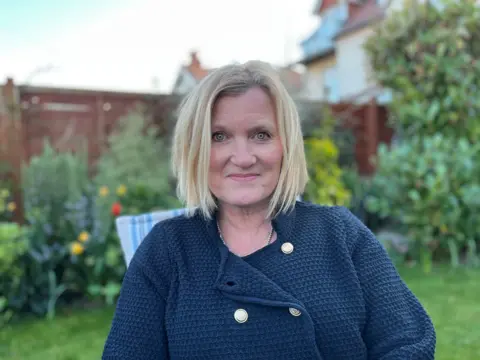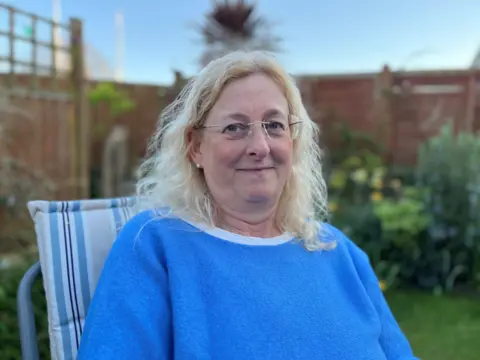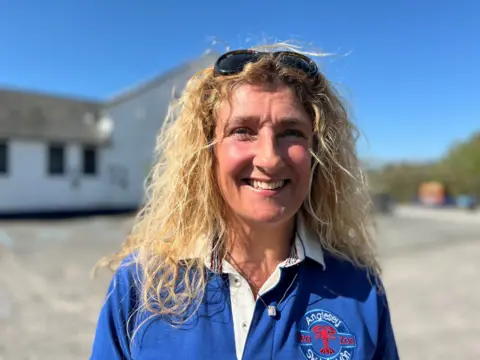'Brutal' holiday let rules 'risk thousands of jobs'
 Getty Images
Getty ImagesThousands of tourism jobs could be lost in Wales without changes to "brutal" holiday let rules, an industry body has warned.
The Professional Association of Self Caterers (PASC) said members were selling up as many lets were no longer viable.
Council tax changes in 2023 made it harder for them to qualify for cheaper business rates, in a drive to improve locals' access to properties in holiday hotspots.
The Welsh government said it ensured people made "a fair contribution in areas where they have homes or run businesses".
What are the rules around holiday lets in Wales?
Previously, properties made available for let for at least 140 days - and actually let for 70 - qualified for lower business rates rather than council tax.
That system still operates in England.
However, in Wales properties now need to be made available for at least 252 days, and actually let for 182.
If not, they can be classed as second homes and liable for council tax - which in some areas means paying an additional premium.
Nicky Williamson, of PASC for Wales, warned many operators were struggling to meet the threshold, particularly during quieter months.
She said without the "bed stock" of self-catering properties "we don't have the facilities for tourists to stay".
If tourism failed, she added, "then the number of people that are employed in tourism, they will start to lose jobs - the pubs, the cafes... if there's no tourists, they're not going to survive."
With the latest Welsh government figures showing 159,000 people employed in the sector, Ms Williamson said the negative effect could lead to thousands of job losses.

However, Jeff Smith of Welsh language campaign group Cymdeithas yr Iaith, said the measures would help "to improve the supply of housing for local people by reducing the number of second homes and controlling the number of holiday lets".
He also said they should lead to more affordable housing for local people.
A recent PASC survey to gauge the mental health of self-catering operators showed 94% of respondents were stressed by the 182-day rule, with 60% saying they did not expect to meet the threshold this year.
Ms Williamson said she knew of one farming family, previously been encouraged by government to diversify into offering self catering lets, recently received a £37,000 council tax bill due to not meeting the 182-day requirement.
"The mental health effects of that, of just not knowing if you're going to be landed with a massive bill, is brutal."

Karen Jones, who runs a holiday let business in Conwy county, said she and her husband were often contacting regulars offering a 20% discount to encourage visits in February and March.
Filling bookings in quieter months delayed other work such as essential maintenance, and "panic" set in if anyone cancelled, she added.
Frankie Hobro, owner of Anglesey Sea Zoo, said she had seen more than a 20% drop in visitor numbers since 2023, which she "directly linked" to the 182-day rule.
She said there were "huge numbers" of empty properties for sale, because people had left the self-catering sector due to the 182-day threshold, but that they were too expensive or unsuitable to be local homes.
She feared empty homes would be bought by large organisations, adding: "They're the only people that can afford to keep running them as a business. That doesn't benefit anybody".

William Matthews, of north Wales holiday home letting agency Oyster Holiday Cottages, said he understood the principle of the change, but he believed the 182-day threshold was too high.
"The difficult part is we're in agreement that the houses need to be filled year round. We've always pushed those shoulder months as much as we can to bring customers to north Wales the whole time, putting money into the economy.
"However, there is a tipping point, and it has potentially gone a bit too far."
While he worries about the potential effects on investment in north Wales, Mr Matthews remains optimistic about the future of the industry.
"People are always going to come on holiday here. I don't think we'll ever lose that," he said.
The Welsh government said: "We recognise the importance of tourism to the Welsh economy, but must balance that with the needs of our communities, as everybody has a right to a decent, affordable home to buy or to rent that allows them to live and work locally.
"Our package of measures to tackle the impact of second homes and holiday lets helps ensure owners are making a fair contribution in areas where they have homes or run businesses."
Additional reporting by Gwenllian Glyn
